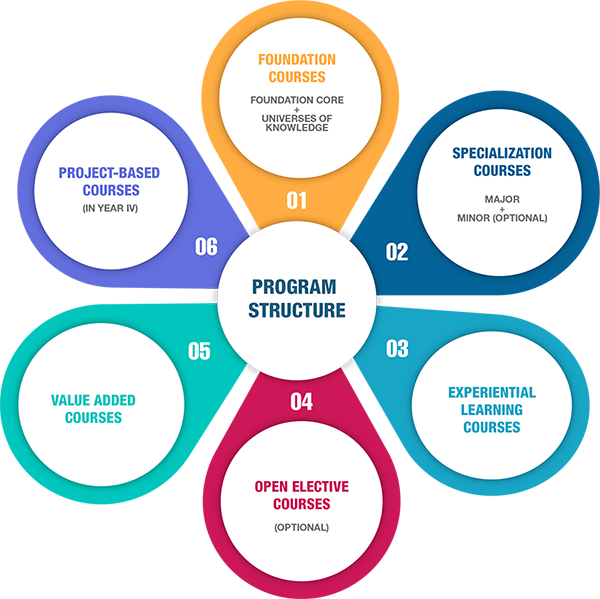
Bachelor of Design (B.Des)
The Bachelor of Design (B.Des) is a specialized undergraduate program that focuses on developing students' skills in various design disciplines. Please note that specific details can vary between universities and countries. Here's a general overview of what you might expect in a Bachelor of Design program:
1. Duration:
- The typical duration of a B.Des program is four years, but it may vary.
2. Core Subjects:
- Design Fundamentals
- Visual Communication
- Design Thinking
- Drawing and Sketching
- Color Theory
- Typography
- Design History
- 3D Design and Modeling
- Digital Design
- Design Research
- User Experience (UX) Design
- Design Management
3. Specializations:
- Depending on the university, students may have the option to specialize in specific design fields such as:
- Graphic Design
- Industrial Design
- Fashion Design
- Interior Design
- Web Design
- Animation
- Game Design
- Product Design
- Interaction Design
4. Studio Projects:
- Students often engage in hands-on studio projects to apply theoretical knowledge to real-world design challenges.
5. Internship/Work Placement:
- Some programs may include mandatory internships or work placements to provide practical experience in the industry.
6. Elective Courses:
- Students may have the opportunity to choose elective courses in areas of interest, allowing them to tailor their education.
7. Design Software:
- Instruction on using design software tools relevant to the chosen specialization (e.g., Adobe Creative Suite, AutoCAD, etc.).
8. Final-Year Project:
- Many programs require students to complete a final-year project or thesis, demonstrating their mastery of design concepts and skills.
9. Portfolio Development:
- Students work on building a professional design portfolio throughout the program, showcasing their best projects and skills.
10. Seminars and Workshops:
- Attendance at seminars, workshops, and guest lectures by industry professionals may be part of the curriculum.
11. Assessment:
- Assessment methods often include a combination of projects, exams, presentations, and critiques.
12. Collaboration:
- Design programs often encourage collaboration among students, mimicking real-world design team dynamics.
13. Career Development:
- Some programs may include career development modules or workshops to help students prepare for the job market.
Before enrolling in a Bachelor of Design program, it's essential to research and understand the specific curriculum, faculty, and facilities offered by the university or college you are considering. Additionally, stay updated on any changes or updates to the program structure.


A Bachelor of Design (B.Des) degree holds significant importance for several reasons, as it equips students with a diverse set of skills and knowledge that can be applied across various industries. Here are some key points highlighting the importance of a Bachelor of Design degree:
1. Specialized Skill Development:
- B.Des programs provide specialized training in various design disciplines, such as graphic design, industrial design, fashion design, etc. This focused education allows students to develop specific and valuable skills within their chosen field.
2. Creative Problem-Solving:
- Design education emphasizes creative and critical thinking, enabling graduates to approach problems innovatively. The ability to think outside the box and find unique solutions is highly valued in many industries.
3. Portfolio Building:
- Throughout the program, students work on diverse projects that contribute to the development of a comprehensive design portfolio. A strong portfolio is crucial for showcasing one's skills and creativity to potential employers or clients.
4. Adaptability:
- Design programs often expose students to a variety of design tools, technologies, and methodologies. This adaptability is essential in a rapidly evolving technological and creative landscape.
5. Industry-Relevant Knowledge:
- B.Des programs are designed to stay current with industry trends and technologies. Graduates are equipped with the latest knowledge and skills, making them valuable assets in the professional world.
6. Multidisciplinary Approach:
- Many design programs encourage interdisciplinary collaboration, allowing students to work with peers from different fields. This experience helps in developing a holistic understanding of design and its applications.
7. Communication Skills:
- Design education emphasizes effective communication, both visually and verbally. Graduates are trained to articulate their ideas clearly, which is a valuable skill in any professional setting.
8. User-Centered Design:
- Many design programs, especially those focused on interaction and user experience design, teach the principles of user-centered design. This approach ensures that graduates can create products and experiences that meet the needs and preferences of end-users.
9. Entrepreneurial Opportunities:
- The entrepreneurial spirit is often fostered in design programs. Graduates may choose to start their own design studios, freelance, or work in entrepreneurial environments, leveraging their creative and business skills.
10. Global Perspective:
- Design programs often expose students to global design trends, allowing them to develop a broader perspective and understanding of design on an international scale.
11. Versatility:
- Design graduates can find opportunities in a wide range of industries, including advertising, marketing, technology, fashion, entertainment, and more. The versatility of design skills makes graduates adaptable to various career paths.
12. Job Opportunities:
- The demand for skilled designers is present across industries. Graduates can pursue careers as graphic designers, UX/UI designers, industrial designers, fashion designers, and more.
In summary, a Bachelor of Design degree is important as it equips individuals with a unique combination of creativity, technical skills, and problem-solving abilities, making them well-suited for diverse professional roles and contributing to innovation in various industries.
